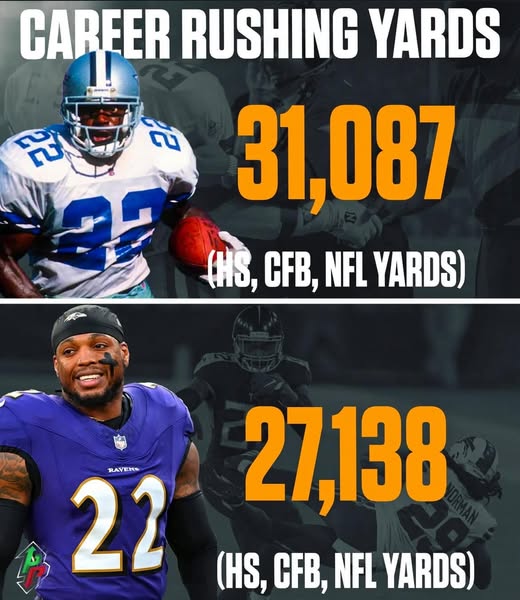The debate over who belongs in the pantheon of the greatest running backs in NFL history is one that sparks passionate arguments among fans, analysts, and historians alike. Names like Jim Brown, Walter Payton, Barry Sanders, Emmitt Smith, and LaDainian Tomlinson are frequently mentioned in the conversation for the top five. But in recent years, Derrick Henry has emerged as a dominant force, prompting some to wonder whether he could eventually crack that elite group. Is it unrealistic to consider Henry as a potential top-five running back of all time, or does his unique combination of size, production, and longevity give him a legitimate shot? To answer this, we must examine his career thus far, compare him to the legends, and consider the evolving nature of the running back position in the modern NFL.
Derrick Henry’s rise to stardom has been nothing short of spectacular. Standing at 6’3” and weighing nearly 250 pounds, he is a physical anomaly at the running back position, combining the size of a linebacker with the speed and agility of a traditional feature back. After a slow start to his career as a backup to DeMarco Murray, Henry exploded onto the scene in 2018, culminating in a 238-yard, four-touchdown performance against Jacksonville that signaled his arrival as a force to be reckoned with. Since then, he has been the most dominant rusher in the league, leading the NFL in rushing yards in 2019 and 2020 while also becoming the eighth player in history to surpass 2,000 yards in a single season in 2020. His ability to wear down defenses with his punishing running style and break away for long touchdowns makes him a rare breed in today’s pass-heavy NFL.
However, when discussing the all-time greats, sustained excellence is the benchmark. The top five running backs in history didn’t just have peak seasons—they dominated for the better part of a decade or more. Jim Brown played only nine seasons but led the league in rushing eight times and averaged an absurd 5.2 yards per carry for his career. Walter Payton was the epitome of durability and consistency, rushing for over 1,000 yards in 10 of his 13 seasons while also contributing as a receiver. Barry Sanders electrified the league with his unparalleled elusiveness, retiring early but still amassing over 15,000 rushing yards. Emmitt Smith holds the all-time rushing record with 18,355 yards, a product of his longevity and productivity in a high-powered Cowboys offense. LaDainian Tomlinson redefined the position as a dual-threat back, scoring a record 31 touchdowns in a single season. These players didn’t just have moments of brilliance—they were brilliant for years on end.
Derrick Henry’s case is complicated by the fact that he didn’t become a full-time starter until his third season, and his workload has been massive in recent years, raising concerns about how long he can maintain his peak performance. Running backs historically decline rapidly after age 28, and Henry is now 30, an age where most backs are either diminishing or out of the league entirely. The Titans have relied on him heavily, with Henry leading the league in carries in 2019, 2020, and 2022. That kind of usage takes a toll, and while Henry has defied the odds so far, the specter of decline looms large. To even enter the top-five conversation, he would need to continue producing at an elite level for several more seasons, something that is easier said than done given the physical demands of his style of play.
Another factor working against Henry is the changing value of the running back position in the modern NFL. The league has shifted toward a pass-first mentality, and teams are increasingly reluctant to invest heavily in running backs, both in terms of draft capital and salary. This makes Henry’s dominance even more impressive, but it also means he’s playing in an era where the running game is often de-emphasized. The all-time greats like Smith, Payton, and Brown played in eras where the run game was the focal point of offenses, allowing them to accumulate staggering statistics. Henry’s ability to thrive as the centerpiece of the Titans’ offense in today’s NFL is remarkable, but it also means he’s fighting against a system that doesn’t prioritize his position the way it once did. This context is important when comparing his numbers to those of past legends.
That said, Henry’s unique skill set and production cannot be ignored. He is one of the most physically imposing runners the game has ever seen, capable of breaking tackles with ease and outrunning defensive backs for long scores. His 2020 season, where he rushed for 2,027 yards, is one of the most impressive feats in recent memory, especially considering he did it in a 16-game season (unlike Adrian Peterson, who reached 2,097 yards in 2012). Henry also has a playoff pedigree, with memorable performances like his 195-yard game against Baltimore in the 2020 playoffs. If he can add a Super Bowl ring to his résumé, it would bolster his case significantly, as championships often play a role in how players are remembered in the all-time hierarchy.
The biggest hurdle for Henry, however, is the sheer volume of career accomplishments needed to crack the top five. Even if he continues to play at a high level for a few more years, it’s unlikely he’ll reach the career rushing totals of Smith, Payton, or Sanders. Smith’s record of 18,355 yards seems untouchable, and even reaching the top five in all-time rushing (currently held by Jerome Bettis at 13,662 yards) would require Henry to maintain his production well into his 30s. Given the short shelf life of running backs, that’s a tall order. Henry’s best chance is to continue dominating in the short term, perhaps adding another rushing title or two, and hoping that his peak years are so spectacular that they outweigh his lack of longevity compared to the all-time greats.
In the end, while it’s not impossible for Derrick Henry to enter the top-five conversation, it’s certainly an uphill battle. The running backs currently in that tier set an incredibly high standard with their combination of peak performance, longevity, and overall impact on the game. Henry’s physical dominance and recent production make him one of the most exciting players of his generation, but he would need to sustain this level for several more years to truly join the likes of Brown, Payton, Sanders, Smith, and Tomlinson. Realistically, he is more likely to be remembered as one of the best of his era rather than one of the top five of all time. That’s no slight against him—it’s simply a reflection of how high the bar has been set by the legends who came before him.
Derrick Henry’s career is a testament to what a uniquely talented and hardworking running back can achieve in the modern NFL. Whether he cracks the top five or not, his place in football history is already secure. But for now, labeling him as a potential top-five all-time back remains a stretch—one that would require a near-miraculous continuation of his current trajectory.



